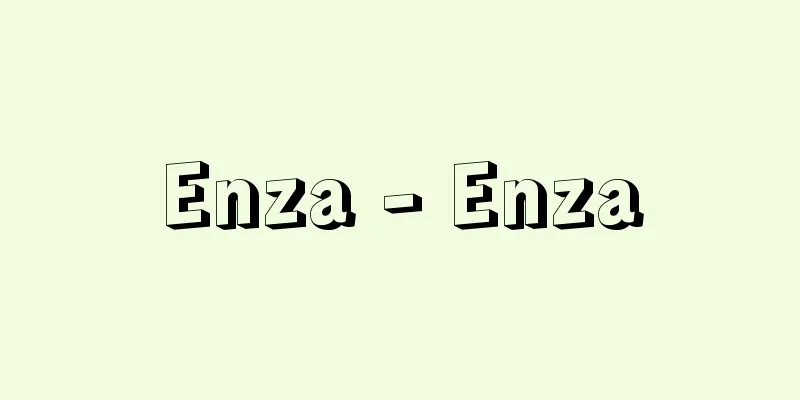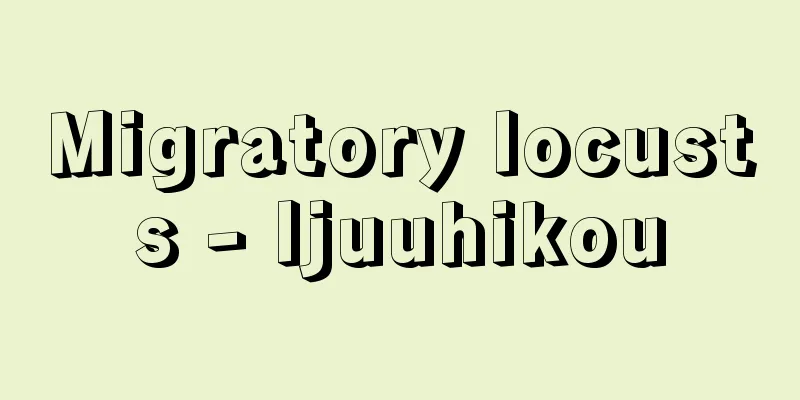Enza - Enza

|
Being held criminally responsible for a crime committed by a relative, even though one was not involved. The term and system of enza have existed since ancient times in China, but it was a system intended to intimidate the public and prevent crime. The enza system in the laws of the Japanese emperor (the Taiho Law and the Yoro Law) was modeled on the Tang Law, and punished ignorant relatives of criminals for high treason and treason (later adding privately minted coins, which are coins secretly minted by private citizens). The Kamakura Shogunate Law also had a system of enza, in which the wife was also punished if her husband committed a serious crime such as treason, but there was a tendency to restrict this system. During the Muromachi period, especially from the end of the period through the Warring States period, the system of enza became widespread, but there were many provinces where the crimes of the parents were imposed on the children. In the early Edo period, influenced by the laws of the Sengoku period, there were cases where the system of enza was recognized to a fairly wide range. For example, in cases of serious crimes such as the murder of one's lord, parents, siblings, and even the entire family were punished. A decree from the 9th year of the Kyoho era (1724) limited enza to the children of those who had murdered their lords, murdered their parents, or committed particularly serious crimes. The Kujikata Osadamedaki, a decree from the 2nd year of the Genbun era (1737), limited the scope to the children of those who had murdered their lords or murdered their parents. In the case of samurai, the enza system continued to be applied to a wide range of cases even after this time. During the time of Matsudaira Sadanobu (senior councilor, 1787-93) and thereafter, a proposal to amend the law on enza for samurai was brought to the shogunate council, but no decision was made. The enza system continued even in the Meiji era, and was abolished by the old Criminal Code that came into effect in 1882. [Ryosuke Ishii] Source: Shogakukan Encyclopedia Nipponica About Encyclopedia Nipponica Information | Legend |
|
親族の犯罪につき、関係ないにもかかわらず、刑事責任を負わされること。縁坐の語および制度は、中国で古くからあったが、世人を威嚇して犯罪を予防する目的をもった制度であった。日本の上世の律(大宝(たいほう)律、養老(ようろう)律)の縁坐の制は唐律に倣ったもので、大逆、謀叛(むほん)(のちに私鋳銭(しちゅうせん)〈民間でひそかに鋳造した銭貨〉が加えられた)について、情(じょう)を知らない犯罪人の近親を処罰した。鎌倉幕府法でも、夫が謀叛などの重罪を犯したときは妻も処罰されるというように、縁坐の制があったが、これを制限しようとする傾向が認められる。室町時代、とくにその末期から戦国時代にかけては、縁坐の制は広く行われるようになったが、ことに親の科(とが)を子にかける分国が多かった。江戸時代もその初期には、戦国時代法の影響を受けて、相当広い範囲にわたって縁坐の制を認めた場合がある。たとえば、主(しゅ)殺しのような重罪では、父母兄弟一族までも処罰したことがある。享保(きょうほう)9年(1724)の法令は、縁坐を主殺し、親殺し、および格別重い科の者の子に限っている。公事方御定書(くじかたおさだめがき)は元文(げんぶん)2年(1737)の法令によって、その範囲を主殺しおよび親殺しの罪人の子にとどめた。武士の場合にはこれ以後でも依然広範囲に縁坐制が適用された。松平定信(さだのぶ)(老中在任1787~93)の時代およびその後も武士の縁坐法の改正が幕議に上ったが、決定をみなかった。明治になってからも縁坐の制は存し、それが廃止されたのは明治15年(1882)施行の旧刑法によってである。 [石井良助] 出典 小学館 日本大百科全書(ニッポニカ)日本大百科全書(ニッポニカ)について 情報 | 凡例 |
Recommend
Senkaku Bay
This scenic coastal spot is located in the wester...
Narodnoe delo (English spelling)
… In the same city, he cooperated with Herzen'...
Grantessa shimeji (English name)
Phylum Porifera, Class Calcareous Sponges, Family ...
Haufendorf
...When we consider the settlement forms of Europ...
Fiorelli, T.
…Dressed in black from head to toe, he initially ...
Hyperpolarization -
…The excitatory postsynaptic potential is a depol...
Suiones
…the cultural, religious and political centre of ...
Automorphic function
There is a group G whose elements are linear fract...
Oishi Senbiki - Oishi Chibi
Year of death: Tempo 5.9.13 (1834.10.15) Year of b...
Saurauia oldhamii (English spelling) Saurauiaoldhamii
...It is distributed from Japan to the northeaste...
International Telecommunication Union (Kokusai Denkitsu Shinrengo)
ITU is a United Nations specialized agency in the...
Muragiri - Muragiri
The Taiko land survey and subsequent land surveys ...
Woodhull, Victoria Claflin
Born September 23, 1838 in Homer, Ohio. [Died] Jun...
Wing area
Aerodynamics is the process by which the airfoil ...
Cyperus alternifolius (English spelling)
…Paper [Hiroshi Aramata]. … *Some of the terminol...









